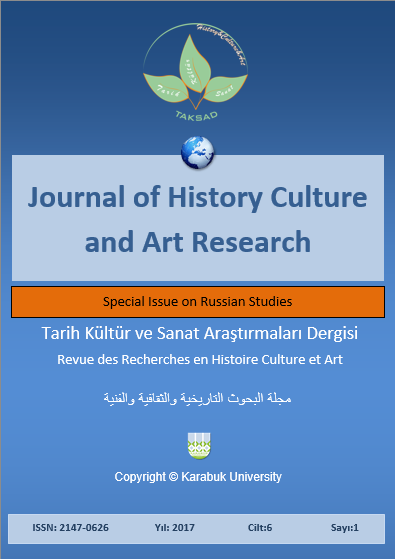The Impact of Stress Stability on Job Satisfaction and the Quality of Human Capital
DOI:
https://doi.org/10.7596/taksad.v6i5.1252Anahtar Kelimeler:
Stress- Stressors- Stress resistance- Bank employees- Job satisfaction- Wage satisfaction.Özet
Long professional stress has a significant impact on the psychological state of employees that inevitably affects the activities of any organization. Therefore, at present, more and more attention is being paid to minimize the negative consequences of stressful staff conditions, with the help of specific procedures of stress management. In this paper, we investigated the impact of stress, the types of stress-resistance of staff individual, and the influence of stress on the degree of job satisfaction of bank employees. The study concludes that the following factors affect the level of job satisfaction of bank employees: wage satisfaction, the level of stress at the workplace, and the relationships in the team. The main factor of the bank employees stress is a large amount of work and a short time period for doing the work.
Referanslar
Akhmetshina, E. R. & Mustafin, A. N. (2015). Public-private partnership as a tool for development of innovative economy. International Conference on Applied Economics (ICOAE) 2015. Procedia Economics and Finance, 24, 35-40.
Ardakani, P. P.; Ghanbaran, A. & Sharghi, A. (2017). Environmental Factors’ Effect on Stress Reduction of Employees: A Case Study on Farhangian University Staff in Tehran. Journal of History Culture and Art Research, 6(3), 282-296. DOI: http://dx.doi.org/10.7596/taksad.v6i3.923
Bowen, P. A.; Edwards, P. B.; Lingard, H. B. & Cattell, K. A. (2014). Predictive modeling of workplace stress among construction professionals. Journal of Construction Engineering and Management, 140, 1-10.
Hadzibajramovic, E.; Ahlborg, G.; Grimby-Ekman, A. & Lundgren-Nilsson, A. (2015). Internal construct validity of the stress-energy questionnaire in a working population, a cohort study. BMC public health, 15, 1524.
Idris, M. A.; Dollard, M. F. & Tuckey, M. R. (2015). Psychosocial Safety Climate as a Management Tool for Employee Engagement and Performance: A Multilevel Analysis. International Journal of Stress Management, 22, 183-206.
Kabasheva, I. A.; Rudaleva, I. A.; Bulnina, I. S. & Askhatova, L. I. (2015). Organizational factors, affecting employee innovative behavior. Mediterranean Journal of Social Sciences, 6(1S3), 435-439.
Oosenbrug, E. (2015). The Age of Stress: Science and the Search for Stability. Journal of the history of the behavioral sciences, 51, 104-106.
Palmer, M. L.; Henderson, M.; Sanders, M. R.; Keown, L. J. & White, J. E. (2015). Study protocol: evaluation of a parenting and stress management programme: a randomised controlled trial of Triple P Discussion Groups and Stress Control. BMC public health, 15(256).
Ruppel, C. P.; Sims, R. L. & Zeidler, P. (2013). Emotional labour and its outcomes: A study of a Philippine call centre. Asia-Pacific Journal of Business Administration, 5, 246-261.
Savage, D. A. & Torgler, B. (2009). Nerves of steel? Stress, work performance and elite athletes. CREMA. Working paper series, 9.
Schmidt, B.; Loerbroks, A.; Herr, R. M.; Wilson, M. G.; Jarczok, M. N.; Litaker, D.; Mauss, D.; Bosch, J. A. & Fischer, J. E. (2014). Associations between Supportive Leadership and Employees. Self-Rated Health in an Occupational Sample. International Journal of Behavioral Medicine, 21, 750-756.
Selye, H. (1950). Stress and the General Adaptation Syndrome. British medical journal, 1(4667), 1383-1392.
Shi, M.; Wang, X.; Bian, Y. & Wang, L. (2015). The mediating role of resilience in the relationship between stress and life satisfaction among Chinese medical students: a cross-sectional study. (2015) BMC medical education, 15.
Skobleva, E. I.; Fedorova, E. P. & Lunev, A. P. (2015). Educational Strategy as a Form of Economic Behaviour. Asian Social Science, 11(20), 148-160.
Yao, Y. H.; Fan, Y. Y.; Guo, Y. X. & Li, Y. (2014). Leadership, work stress and employee behavior. Chinese management studies, 8, 109-126.
İndir
Yayınlanmış
Nasıl Atıf Yapılır
Sayı
Bölüm
Lisans
Tarih Kültür ve Sanat Araştırmaları Dergisi'nde yayımlanan tüm çalışmalar Creative Commons 4.0 CC-BY lisansı ile lisanslanmıştır.
Bunları yapmakta özgürsünüz:
- Bu eseri her boyut ve formatta paylaşabilir — kopyalayabilir ve çoğaltabilirsiniz.
- Materyalden Adapte et — karıştır, aktar ve eserin üzerine inşa et
- her türlü amaç için, ticari amaç da dahil
Alttaki şartlar altında:
Atıf — uygun bilgiyi, lisansa linki, and ve değişiklik yapıldıysa değişiklik bilgisinivermelisiniz. Sizi veya kullanımınızı lisansörün onayladığı bilgisini içermemek kaydıyla, size uygun şekilde bu işlemleri gerçekleştirebilirsiniz.
AynıLisanslaPaylaş — Eğer materyali karıştırdınızsa, aktardınızsa ya da materyalin üzerine çalıştınızsa, ancak aynı lisans ile dağıtabilirsiniz.
- Ek sınırlamalar yoktur — Lisansın izin verdiği hakları başkaları üzerinde kanunlarla ya da teknolojiyikullanarak sınırlayamazsınız.







